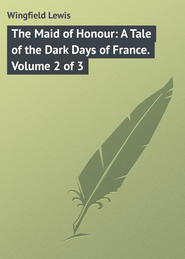По всем вопросам обращайтесь на: info@litportal.ru
(©) 2003-2024.
✖
The Curse of Koshiu: A Chronicle of Old Japan
Настройки чтения
Размер шрифта
Высота строк
Поля
This was whimsical-illogically planned-and Hojo a fool for his pains, When he contemplated the folly of the man he hated in his heart, the grim visage of the cautious Nara was puckered into unaccustomed smiles. The advice he would give in the future-so the wily lord decided-must depend on the attitude of his son-in-law, and be guided by the course of events for the benefit of the imperial prisoner. In his mind's eye (if Hojo could only have guessed it!) he beheld with secret exultation the brutish No-Kami sinking lower and lower by sure degrees into debauchery, until the moment should arrive when the ruler would become the ruled. And then-and then! Well, time must show what then. Sufficient for the day is its labour.
Just as a Nimrod of the chase may fly safely over tremendous obstacles and be undone by a ditch at last, so was it with old Hojo. He sallied forth one day to put down an insignificant riot in never tranquil Satsuma, and received there his quietus. As already related, the faithful Tomoyé died with him, and No-Kami-juvenile, inexperienced, and cruel-was called to reign in his stead. And now, no longer restrained in the smallest degree by respect for a severe mother or fear of a fiery father, the new despot, surrounded by parasites, gave free rein to all his vices.
The unaccustomed period of peace came to an abrupt conclusion. The young Mikado having been goaded one day to remonstrate with his new jailor, the latter raised his fan and slapped the august cheek. The Kugés flew to arms to avenge their outraged lord, but No-Kami, with the aureole of his father's prestige still about him, was too much for them. The nobles who dwelt in the palace bore but little of the stamp of warriors. The astute Nara, whilst hating the young man, saw that now, while the aureole remained unfaded, it was not yet the time to strike. He assumed therefore, with much parade of zeal, the rôle of mediator between his master and his son-in-law. At first in vain.
An unorganised band of patriots took the field, who were speedily routed and slain; and No-Kami, like the tyrant that he was, ungenerously pursued his advantage. Thanks to Nara's intervention, he refrained from deposing the Mikado; but he made up for this act of clemency by committing outrageous deeds. Banishment and confiscation were the order of the day. The estates of those who had dared to unsheath the katana were distributed among the minions of the despot. All over Japan, those who loved their country heard with groans of the annihilation of the loyalists, and the pitiful condition of the Emperors. There was a puppet Mikado at Kiŷoto, and a nominal Shogun at Kamakura, but they were both under the tutelage of Hojo.
No-Kami, as Nara hoped and expected, flushed with easy victory, and drunk with blood, resigned himself for a while to luxury, and neglected public business. A horde of rapacious bravos and licensed bandits sucked the lifeblood and paralysed the energies of the people. The weight of taxes, that ever crushes the spirit of the Asiatic peasant, grew heavier, day by day, until existence became intolerable. How was an end to be put to this nightmare? That was the question which all were fearfully whispering, and to which there seemed no solution.
No-Kami, if self-indulgent and ruthless, was no zany. He knew that his position was to be maintained by fear and a strong hand, and that enervation meant destruction. Bundles of bamboo, when bound together, will dam a stream, though each separate stem is but a feeble wand. The insurrection of effeminate Kugés had been precipitate and foolish. If the whole country were to rise like one man, he would, as he was aware, be swept like rice chaff into the sea. In the mutual jealousy of the Daimios lay his chief safeguard. While plunging each in separate discomfort, union at all costs must be prevented. Attempts at conspiracy among the nobles, or at combinations among the lower classes, must be frustrated, and to that end he gave strict orders to officials and tax-collectors to allow of no public meetings. The people were to pay what was demanded of them, humbly and dutifully, as best they could, but on no account were to be permitted to hold gatherings. Even the great festivals of the year were for a while to be discontinued.
Over and above these precautions, the tyrant surrounded his person with a picked body-guard of Samurai, or two-sword men; hedged his fortress with bristling defences; and recalled his brother, the brilliant Sampei, from his career of victory abroad.
Urged possibly by a spirit of contrariness, a contempt for the society of his prisoner and the Kugés-perhaps by a sense of freedom from personal danger there-the favourite abode of No-Kami was his castle of Tsu, four days' journey from the capital, over precipitous hills. Here he loved to dwell, surrounded by his brawling warriors; sojourning from time to time, when business called him to Kiŷoto, at a small but superb villa, called the Golden House, which stood secluded in a park on the outskirts of the sacred city.
The castle of Tsu was one of the strongest in Japan (the outline of its foundations still remains to attest to its vast area), and covered, within the square space of the outer moat, sufficient ground to accommodate an army. This outer moat, upon which many a shallop floated, was wide and deep and sluggish on three sides, masked by a luxuriant crop of lotos; while the fourth wall was washed by a rapidly-running river, the Iwatagawa, which a couple of miles away brawled into the sea. Out of the water rose a platform of great stones, with a fringe of gnarled and rusty pines, through which were visible battlements of earth crowned by a low parapet. At each corner was a huge four-storied building, fitted with four wide roofs of sculptured copper; the walls of whitewashed plaster within frameworks of unpainted wood. Inside this outer defence was a recreation and drill-ground of sufficient extent to allow of room for jousts and spectators, as well as trees and vegetable gardens, and a village of wooden huts for soldiery and camp followers. Dwellings of a better class were clustered like seashells about the second or inner moat, which enclosed a second wall.
Within the inner square was a space of considerable size, in the centre of which uprose the castle, a four-sided tower three hundred feet in height, tapering towards the top. By reason of its many roofs or verandahs of burnished and sculptured bronze, it seemed more like a cluster of many towers, the centre one the loftiest; and a picturesque object it was, for owing to the prevalence of earthquakes, all the walls above the foundation platform were of whitened mud and plaster, enclosed like the corner buildings within frames of timber; while the middle roof reared its head with overhanging eaves to a sharp point, crowned on the apex by a great fish, fashioned of pure gold.
This fortress was, barring miracle or treachery, justly reputed impregnable. Both moats were crossed by drawbridges, as an extra caution against surprise. The outer entrance was approached round a corner, so that the gate with its side postern was doubly commanded from above. Even if the outer wall were stormed, the inner one frowned on the intruder with manifold engines, while the ground about it could be rendered untenable by missiles from the summit of the tower.
A bowshot from the outer moat, westward from the river bank, the town of Tsu, with straggling suburbs, meandered, low and grey, like a long serpent. All Japanese towns are of one colour, walls and roofs alike, of wood unpainted and weatherworn, rendered a shade more silvery by clusters of pale lichen; but Tsu was more monotonously gloomy in aspect than most, by reason of damp and misery. The country close around, with the exception of two low hills, was flat and sedgy, broken by marshes and shallow rivulets. Away, hazy, melting into blue, could be discerned the encircling peaks of the range, beyond which is Kiŷoto. Grand mountains these, rugged and austere, with many a beetling crag. Mikuni Yama; Outake San; and away to the south-east Asama Yama, the majestic chief volcano of Japan.
The town of Tsu differed from others in that it displayed none of the spick-and-span cleanliness for which the land of the Rising Sun is as conspicuous as European Holland. The outlying cottages bore the stamp of squalor and ague, standing in oozy sludge. So did the people bear the brand of sorrow, as, listless and inert, they dragged their heavy feet. As a poor show of enterprise, a few unripe persimmons, which no one desired to buy, were exposed for sale in the mire; while here and there a tray of sorrel-like leaves were placed to dry (?) – a plant used for dying blue the cotton which is the common garment of the peasant. There was none of the briskness and gaiety to be seen that make rural Japan so cheery. None of the incessant chatter and laughter and pattering of clogs, the rush-and-tumble of naked brown babies, the whirr of the silk-looms, the busy hammer of the carpenters.
The houses, wide open to the street, displayed the usual raised platform of wood, smoothly planed, covered with matting, with hibachi or firebox in the middle; but there was no brilliant glimpse beyond of the wonderful toy gardens, with rocks and dwarfed trees and straying tortoises and gaudy flowers and crickets in tiny cages, which distinguish a prosperous village. The paper windows or screens being always pushed back in their grooves during the day, a rustic Japanese household of the lower class may be said to live in public; for, till the screens are replaced, which they usually are at dusk, there may be said to be no privacy. You have a free view of goodman or matron in the bath, or at the toilet, or eating, or sleeping, or at work, and unabashed-with innocence sometimes for only garment-they nod to you pleasantly with a cheerful "Ohayo!" as you pass. Tsu was too degraded, steeped to the lips in grinding poverty, to have energy for work or washing, much less for the homely ornament of a single lily in a pot. Almost entirely nude the men, unkempt and frowsy, lolled and slept-such a marvellous variety of attitudes of sleep a sculptor might find there-while the housewife, thin and sallow, naked to the waist, fumbled feebly over the weaving of cheap hats, or grass sandals for man and horse.
Of course the town could boast of a superior quarter, where, in front of houses of a better kind, were flapping blue cotton awnings, each one adorned with the dominant daimio's cognisance. Into one of these, apparently the cleanest and the best, we will enter (first removing our clogs and swords), for what is proceeding within should interest us somewhat.
It is evening. The house-platform is raised on stilts as usual, two feet above ground, and the first room or ante-chamber is open to the street. When we rap with fan on the paper screen beyond, some one cries "Enter," and sliding it aside we find ourselves in a large low room, whose ceiling of unpolished cryptomeria is supported by pillars of cherry. Above the dais or recess of honour at the end, a single picture hangs, representing the thirty-three Kwannon; under it is a gilt image of Buddha; while the monotony of the one wooden wall (the others are formed by paper screens running in grooves) is broken by a wandering spray of maple foliage, painted in autumn tints.
Everything is scrupulously clean and severely simple. You only become aware that this is a superior dwelling, by remarking the fineness of the mats. In the centre, round a large hibachi of bronze, filled with charcoal, a group are huddled close, for the all-pervading damp is chilling to the bones. Two well-known elders of the town are there-Zembei, and Rokubei his friend-the former talking volubly; while a man of middle age, the master of the house, is listening with dubious frown. His wife, Kennui, sits by, his hand in hers; while apart in a corner, with eyes as bright as a squirrel's, and flushed cheek, stands their eldest daughter Miné. Her mind-some call her a forward damsel-is disturbed, for, impatient and annoyed, she pushes aside a screen, and clatters off into the back garden, to tease with a finger the darting gold-fish that with mosquitoes reign in a pond.
The frowning man is Koshiu, the most important farmer in these parts, broad-shouldered, grave, and grizzled, whose opinions are of weight in the province.
Zembei-aged, with face like a walnut-has brought unpleasant news; indeed he has often dropped in of late, and each time his tidings are less agreeable. It is the old story, gruesome and too familiar. The rapacious Hojo needs more money-is always demanding more. But it is quite too bad to worry the men of Tsu, his own home, the poorest district in the Empire. Already the starving population have abandoned hope. In a former life they must have been very wicked, to suffer so much in this.
After a long pause of dejection, "Maybe my lord knows not of our wretchedness," suggests the farmer's wife, by way of pouring oil upon the waters.
"Peace, Kennui!" sighs her spouse. "As well throw stones at the sun, or try to scatter a fog with a fan, as look for humanity from a Hojo! They were ever merciless."
"Too true!" groans Rokubei, the elder. "Thus the matter stands; though you have shown so little interest of late, that perchance I am wasting breath."
"Ay, that hath he!" chimes in Zembei. "Why is it? You, Koshiu, whose words were ever of moment, and treated with respect, although from your stubborn pride you were never popular, instead of helping us, have been hanging back, content with grumbling complaint. We must act now, I tell you, and rend the air no more with idle moaning, or else we perish all! Gird up your loins, man. Awake! For unless this torrent of greed be stemmed, although less poor than most, you will soon be a beggar like the rest."
"My husband," interrupted Kennui, "is misjudged. He loves the people, and grieves for them, but perceives that resistance is useless-idle remonstrance will but make their plight more pitiful."
"The beetle in combat with the bear!" laughed the farmer drearily. "Act, forsooth! All this is idle prate, believe me. What can we do but die?"
"No idle prate," retorted Zembei. "Listen. By deputation-of which you would not form one-we humbly prayed and entreated the local counsellors of my lord: – the leeches-to be more lenient; but they replied that they were only tools, exactly performing his bidding. Then, after anxious thought and discussion, gathering together in secret the chiefs of a hundred villages, at peril of our heads, we resolved to draw up and send a solemn petition, signed by all, to my lord's golden dwelling at Kiŷoto, imploring justice. Twelve of the most respected elders, chosen from the assembly by lot, undertook the dangerous task. Clad in their grass rain-coats, they sallied forth, and arrived in time at Kiŷoto."
"Idiots!" scoffed Koshiu. "Did they pay a long farewell to wives and little ones?"
"Arrived at the Golden House, they were received at the gate with blows and contumely."
"What else did they expect?" inquired the farmer-"to be feasted in the room of honour? Other lords perhaps, dreading public exposure of their misdeeds, might, if pushed, hasten to repair a wrong-the Hojos never; for the Hojos have no shame."
Miné pouted, and rapped the pavement with impatient clog.
"To be sweeping is always to be unjust!" she cried shrilly, from the border of the pond. "There are good as well as bad in every family."
"Hush, child, hush! Be dutiful!" reproved her mother. "Thou wast bewitched by soft empty speeches and a bold bearing. It was a bad day for thee when the lord Sampei came among us!"
"He is good and brave and generous," returned the girl, with burning face, "my lord Sampei!"
Miné cooed out the name that was on every one's lips, with such an exceeding abandonment of tenderness as startled her father into attention.
"More words less sense!" he remarked testily. "My lord Sampei! what hast thou to do with him or his? My lord Sampei forsooth! Wouldst be a Hojo's concubine? Never! I'd see thee dead first."
"The maid speaks not untruly," nodded Rokubei. "Sampei is in all things, save his name, unlike his brother. Through his mother Masago, the holy Abbess, he has peasant blood in his veins."
"And she," chimed in the girl, "the late lord's concubine, although of peasant stock, is worthy to be noble. As good as her son is the Abbess Masago. Cold and severe, no doubt, but just and lovable."
"How the child prates!" cried Madam Koshiu. "The lord Sampei has been absent these five years, skull-cracking, and is but just returned. What canst thou know of him? When he sailed, thou wert a little maid, and even than now more foolish."
"From his mother I have heard of him," admitted the blushing girl.
"So this was thy religious fervour, praying so often at the temple!" exclaimed the angry farmer. "Take heed, thou silly wench, or I will punish thee, and grievously. What! A cur can bark loudly before its own gate, and I can defend my own. Once for all, no more of the lord Sampei, or it will go ill with thee. Banish from thy feather-pate idle worship of thy betters."
The mien of Koshiu was so stern and threatening, that though words of indignant protest rose to her lips, the girl was silent.
"What if he were prevailed upon to intercede for us?" mused Rokubei. "He is as generous as brave-no doubt of that. My lord, after his brother's career of victory, could scarce refuse him a favour."
"Five years bring about great changes," growled the farmer. "Five years ago Hojo No-Kami was no worse than others of his rank. You will never persuade me that aught of good is to be found in a Hojo, legitimate or otherwise. Enough of him. Go on with your story of the elders."
"They were received, as I told you, at the outer gate with blows and curses. Had they not fled, murder would have been done, for a posse of samurai rushed out of the guardhouse, like devils, brandishing pikes. Disconcerted, grieved, and bruised, they returned to their inn to consult. Was the journey to go for nothing? Were they to return like beaten dogs, without even seeing my lord? Peradventure face to face with him something might yet be done, and his hard heart softened by their dismal catalogue of woe. They plumed their ruffled feathers, therefore, and lay in wait, and when he rode forth citywards, emerged from a clump of trees, and kneeling humbly in the dust, presented their petition. He took it, and, grinding his teeth with eyes aflame, turned savagely to his attendants.
"'Remove these wretches!' he thundered, 'who by persistent insolence have deserved more than death. By-and-by will I pass judgment on them. Torment shall reward their temerity.'"
A silence of dismay followed the elder's narrative. Koshiu was surely right-his deep hate justified. It seemed that the existing Hojo was worse than any of his ancestors-and so young too! What a gloomy future for unhappy fatherland! What a sunless roll of years!
"The land is ripe for revolt, if we could find a leader we could trust," observed Zembei, who had been nursing his knees in silence. "The other lords are weary of the Hojo, but unfortunately jealous of each other. If they would bury for a time their private feuds, things might yet come right. He who ventures not within the den, will never take the cub."
"There is no trusty leader, except the victorious General, himself a Hojo!" added the other elder. "Buddha has forgotten us. The case is beyond mortal settling. There is left for us nothing but to die."
Here was a dismal and unsatisfactory conclusion to the debate, and it seemed that there was no other, for each with dolorous visage eyed his neighbour, with nothing more to say.
Miné, tossing off her geta on the garden stones, and springing up with pretty pink feet upon the matted floor, came forward.










